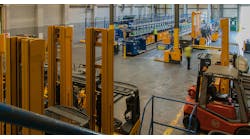In the early 1980s Tom Peters and Robert Waterman published In Search of Excellence (Harper & Row, 1982). The book tells the story of 43 American companies and the eight basic principles of management that made them successful. The bestseller marked the beginning of a growth era in business publishing.
About the same time another book was published that didn't find quite as wide of an audience as Peters' and Waterman's, but it was equally reflective of the angst in American business as U.S. companies struggled to compete with rising foreign competition. Robert Hall's provocatively titled Zero Inventories (Dow Jones-Irwin, 1983) described Japanese production methods and what the just-in-time movement of material was all about. These concepts eventually evolved into what is today known as lean manufacturing.
I recently caught up with Hall and asked him how he thinks U.S. industry is doing today, more than 20 years later, in its pursuit of stockless production. Like a good academic, Hall hesitated to offer any thoughts without having any relevant data or research to back him up, but he did offer several observations about the auto industry.
"If you're not somewhat lean as an auto company or supplier today, you're probably not in the business," he says. "You may not be great but you better not have a lot of excess stuff."
Like quality, lean production and lean material handling processes have become the price of admission in the globally competitive auto industry. Toyota may still set the standard, he says, but not by all that much compared to Honda and others. The growth of global supply chains, with long lead times and more and more stuff on the water, has offset much of the progress that companies have made in reducing overall inventory levels.
At the plant level, Hall believes significant opportunities remain for process improvements that go beyond the adoption of the well-known lean techniques for reducing raw materials, work-inprocess and finished goods inventory. Realizing that opportunity would require significant behavioral and cultural changes for most companies.
"Manufacturers can engineer flow like Henry Ford did. They can make up a value-stream map and tell folks to go kaizen this chunk of it because it looks like it really needs it, but if they can't get beyond that, what you have is an engineered system," he says. The problem with an engineered system is that managers' focus is on the flow of the stuff, the physical things, instead of the development of the people. "If people really are developed, what you get is everyday kaizen," he adds.
Roughly translated from the Japanese, kaizen means "continuous improvement." Many operations managers use the term to headline their efforts for improving their processes by reducing waste and increasing customer value. Everyday kaizen goes beyond establishing a smooth material flow or implementing a 5S program that cleans and visually organizes the workplace. Everyday kaizen capitalizes on everyone's innate problem-solving abilities, and manifests itself in detailed improvements at the workstation level, says Hall.
"To get that you have to get every operator capable of participating in the improvement," he adds. More than anything else, such fundamental cultural changes require communication. Today's immigrant-filled factories and distribution centers, where English is a second language for many people, present a challenge to any such communication efforts, notes Hall. Multiculturalism itself, because diversity of experience is always good, can be an advantage to solving problems. But if people can't communicate well, and can't present their ideas in team meetings, they can't contribute to process improvement.
Some organizations, he notes, have developed strong English language programs to address this problem. That's a start, along with the adoption of basic lean techniques. To get to the next level, and create a true learning organization, requires leadership with a vision of what the operation needs to become, and the ability to model the behavior that they want. It sounds simpler than it is. As Hall says, "No matter how smart someone is, behavioral change is the tough part."
"If you're not somewhat lean as an auto company or supplier today, you're probably not in the business," says Robert Hall.
David Drickhamer,
Editor-in-Chief
[email protected]



